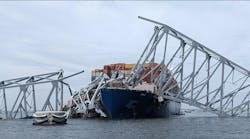Forget the Tea-Partier's debate on President Obama's religion for a moment. The real question is whether he's converting to a technologist. His stumping for infrastructure development and business incentives makes him sound like an active reader of Material Handling & Logistics.
Probably not, but I'm sure he would love your support right now. He's not getting much love from Republicans or Democrats lately, so it seems like he's trying to transform himself into more of a Kennedy Democrat. John F. Kennedy was the first president to enact an investment tax credit, and now this president wants to enact 100% expensing of capital goods investments through 2011. That means an immediate write-off for purchasing a lift truck or a conveyor system, not stretching it out over several years. If this gets support on Capitol Hill it will make providers of material handling and logistics technology very happy, I'm sure.
But in the meantime, those vendors and their customers won't be holding their breath for this dream to come true. Companies have been putting off their investments too long already, waiting for the economic storm clouds to dissipate. Barring incentives from Washington, they're working on their own purchasing incentives, such as shortening the return on investment (ROI) for such purchases.
I wrote an article on this topic for the September issue (the premier of Material Handling & Logistics), and the message of this piece is that the soft benefits of technology are gaining substance with buyers when justifying their purchase. It used to be that the number crunchers in purchasing only understood hard numbers they could wrap their calculators around. Now even “touchy-feely” factors like ergonomics and safety are getting respect. Appropriately enough, this kind of thing is called “sensitivity analysis,” and HK Systems' Mike Kotecki told me he's seeing more of it among his company's clients. It involves “what-if” scenarios.
For example, say you're thinking of investing in an automatic guided vehicle system (AGVS). If this technology is calculated to pay back in 20 months on a two-shift operation, WHAT IF you only have to run one shift, or WHAT IF business grows and you have to expand to three shifts per day?
These kinds of questions were never considered in the purchasing department before, or they might have been ignored, but now these issues are being monetized, according to Kotecki. Other questions going back and forth between procurement officers and logistics managers include:
--What is the historical true cost to the company for recordable accidents?
--What do customer returns really cost?
--What percentage of time are employees unproductive?
--What effect do missed, wrong or late orders have on customer satisfaction data?
--What is the connection between customer satisfaction data and revenue retention?
I don't know if what President Obama is proposing will have much impact on capital equipment expenditures. In fact there's a good chance that even if this investment incentive does pass, the President will still be for raising taxes on dividends and capital gains next year, so hold your exuberance for the time being. In fact, hold onto your wallet, too. You and your vendors might be better off negotiating smart investments on your own terms.


